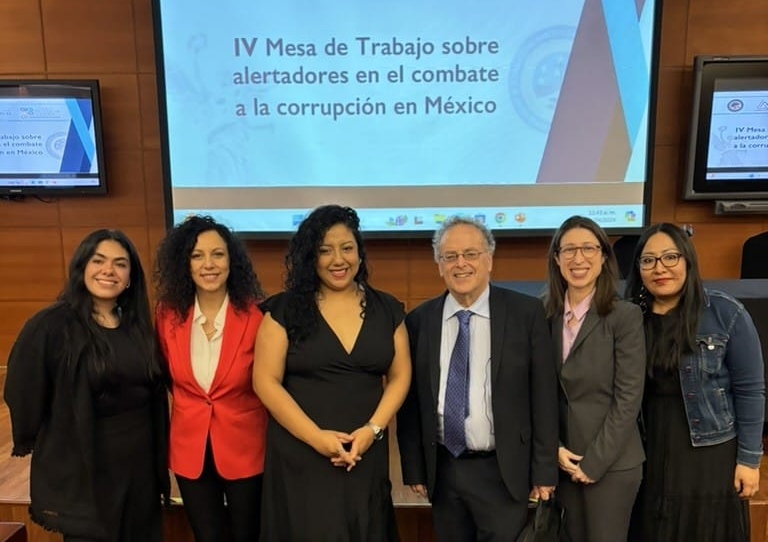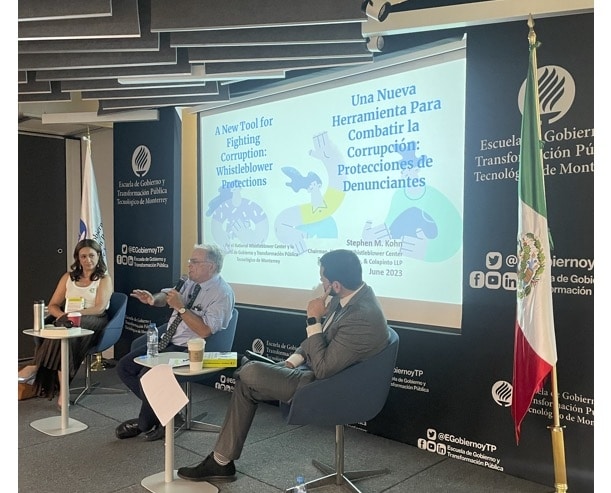Introduction to Corruption in Mexico
What is corruption? Corruption is the abuse of power for personal gain, which can take many forms. The most common that we see today, especially in Mexico, is bribery. Embezzlement and nepotism are also prevalent across Mexico, as is extortion.
This type of corruption puts a major hinderance on society, weaking the institutions built to serve the Mexican people. It also discourages investment and creates an uneven playing field. According to Transparency International's Corruption Perceptions Index, Mexico scores a 31 of 100, with 0 being highly corrupt and 100 being not corrupt.
Within Mexico, the culture of impunity fosters a culture of corruption. Those in positions of power may be able to avoid punishment or their actions. This type of non-accountability degrades public trust which is extremely difficult to reverse without systemic change.
History
Some argue that Mexico's colonial past laid the groundwork for certain aspects of present-day corruption.
However, most acknowledge that Mexico's history of one-party rule for most of the 20th century has led to a culture of centralized power and limited checks and balances, which has created an environment conducive to corruption.
In other words, corruption in Mexico is a result of power being shared amongst a small group of elites who strive to maintain control for themselves versus building strong government institutions that support the public and promote transparency.
This, along with the drug war, and the infiltration of criminal organizations in law enforcement and government institutions, has eroded and weakened Mexican society and accountability, making the fight against corruption extremely difficult.
Types of Corruption in Mexico
Present day corruption in Mexico manifests itself in several ways. Each impacts society at some level; some more dramatically than others. But nonetheless, they all chip away at society, eroding public trust. Below are some of the known types of corruption existing in Mexico today:
- Bribery: this occurs when a person in a position of power, such as a politician, accepts money, gifts, or favors, in exchange for preferential treatment. For example, when a company executive bribes a government official to ignore safety issues on a large construction project. There is a long history of bribery in Mexico, as you will read in the examples.
- Embezzlement: this occurs when a person of power, such as a government official, misuses public funds for personal or business use. For example, a mayor allocating funds for a local infrastructure project, but using the money to purchase or renovate properties.
- Procurement Fraud: in Mexico, this involves bid rigging so that government contracts are given to specific companies, which happens through collusion between government officials and businesses. For instance, a public official may rig a bid for a hospital project, giving the project to a company that was already pre-determined at a super inflated price.
- Nepotism: this is the granting of contracts to friends, family, or political allies, regardless of qualifications. For instance, a Governor appointing their niece to a position of power in state government, even though she is not qualified.
- Extortion: stemming from criminal organizations, extortion occurs when public officials use threats or intimidation to "rob" businesses or individuals. For example, a police officer might demand bribes from local shopkeepers, threatening closure if they do not comply.
These are some of the most common forms of corruption in Mexico today. Some of which are interconnected. Such as a company bribing a public official, which is then used to facilitate embezzlement or procurement fraud.
Other types of non-financial corruption that occurs includes trading in influence, which is a term to describe a lobbying effort in favor of a company owned by the person doing the lobbying.
There is also obstruction of justice, which is the prevention of legal investigations due to an officials' position of power. They may get away with evidence tampering, witness intimidation, and other forms of manipulation to delay or stall an investigation.
If you know of corruption within Mexico that involves a United States based corporation, you may be eligible for rewards and protection for your information under various whistleblower programs.
Examples
There have been numerous cases of corruption in Mexico, which have plagued society over the years. These cases are examples of the type of corruption that still occurs today:
The "Estafa Maestra" (AKA Master Scam) (2017)
Pemex, the Mexican state-owned oil company, became embroiled in a massive corruption scandal known as the "Estafa Maestra" (Master Scam) in 2017.
Allegations surfaced that Pemex executives had colluded with private companies to inflate contracts by a staggering $11.7 billion over a decade. These inflated contracts were then used to funnel funds back to the executives and their associates involved in the scheme. This case exposed vulnerabilities within Pemex to corruption and highlighted the potential for abuse of power within large government institutions.
The scandal resulted in investigations, arrests, and a loss of public trust in Pemex. While the full picture of the case is still emerging, it serves as a stark reminder of the damaging impact of corruption on Mexico's economy and institutions.
Zimmer Biomet (2017)
Zimmer Biomet, a manufacturer of orthopedic implants and related surgical products, was accused of bribing doctors in several countries to use its products. The company paid $177 million to settle FCPA charges with the US Department of Justice and SEC. Zimmer Biomet implemented new anti-corruption compliance programs.
Key Energy Services Inc. (2016)
Key Energy Services Inc., a U.S.-based company, agreed to pay $5 million to settle allegations it violated the FCPA because of its Mexican subsidiary's payments to a contract employee at Petróleos Mexicanos (Pemex), Mexico's state-owned oil company. Key Mexico's employee payments allowed the company to gain advantages in negotiating contracts with Pemex. Key Mexico used a consulting firm to pay the Pemex employee. Key Mexico immediately recorded these payments to the consulting firm.
Walmart Mexico Bribery Scandal (2005)
The retail giant Walmart faced allegations of widespread corruption in its Mexican subsidiary, Walmart de Mexico, in the mid-2000s.
The New York Times reported on an internal investigation launched in 2005 that uncovered evidence of $24 million in bribes allegedly paid to Mexican officials over several years. These bribes were used to expedite permits for store openings, giving Walmart an unfair advantage in the competitive Mexican market.
The case sparked public outrage and raised concerns about the company's corporate culture and oversight practices. While the full extent of the bribery remains unclear, this scandal highlights the potential consequences of corruption for multinational corporations operating abroad.
Oceanografía S.A. de C.V. (2013-present)
Oceanografía, once the largest provider of offshore services to Mexico's state-owned oil company Pemex, was accused of defrauding banks with a massive loan scheme. The company allegedly secured loans from Citi Banamex (formerly Banamex) based on fake invoices for services rendered to Pemex. The estimated value of the fraud is unknown, but Oceanografía employed 11,000 people before the scandal.
The Long-Term Effects
Corruption's impact goes far beyond a moral failing. It discourages investment, misallocates resources, stifles innovation, and hinders economic growth. This, in turn, fuels social inequality by benefiting the wealthy and connected while leaving ordinary citizens without access to basic services.
Furthermore, corruption weakens institutions, erodes trust in government, and creates a breeding ground for organized crime to flourish. As law enforcement becomes compromised, violence and intimidation become tools to maintain control, hindering public safety and overall well-being.
Anti-corruption Efforts in Mexico
Mexico is working diligently to put an end to corruption in Mexico. There have been many efforts in the last several years to combat this issue.
The National Anti-Corruption System (Sistema Nacional Anticorrupción)
Established in 2015, the National Anti-Corruption System aims to create a coordinated approach to tackling corruption. It involves various institutions responsible for prevention, investigation, and sanctioning of corruption offenses.
Civil Society Takes Action
Independent organizations play a crucial role in pushing for transparency and accountability. They raise awareness about corruption, advocate for anti-corruption legislation, and monitor the government’s efforts.
In addition to these systems, reform is still a challenge. The deep-rooted corruption within the institutions designed to serve the Mexican people poses a major obstacle. Getting buy-in from the public and gaining their trust is also an ongoing effort.
These efforts show a growing concern for anti-corruption. Continued pressure from civil society coupled with robust implementation of anti-corruption reforms offer a glimmer of hope for a future with greater transparency and accountability.
In connection with these efforts, US whistleblower advocates and NGOs are also raising awareness about the powerful US whistleblower laws available to those who have information regarding corruption involving US companies, persons, or officials in Mexico.
Continue reading to learn more about these laws.
Reporting Corruption Using U.S. Laws
Those who know of corruption taking place in Mexico by U.S. companies or individuals may be able to use strong U.S. whistleblower laws. Here are a few of the U.S. laws and how they might be used to fight corruption in Mexico:
Foreign Corrupt Practices Act (FCPA)
The Foreign Corrupt Practices Act law prohibits U.S. companies and individuals from bribing foreign officials to obtain business. If a whistleblower uncovers a U.S. company or its subsidiary in Mexico engaging in bribery connected to securing contracts or influencing decisions, they might be eligible to report under the FCPA. Through the SEC Whistleblower Program (below), whistleblowers may even be eligible for a financial reward between 10% and 30% of all sanctions obtained by the U.S. government if the corruption involves a publicly traded company.
Securities and Exchange Commission (SEC) Whistleblower Program
The SEC Whistleblower Program awards individuals who provide information about violations of U.S. securities laws, including those involving accounting fraud or bribery schemes by publicly traded companies, regardless of their location. If a whistleblower has evidence of a U.S. publicly traded company engaging in corrupt activities in Mexico that affect its financial statements, they could report under this program.
Anti-Money Laundering (AML) Laws
Anti-money laundering laws prohibit the laundering of money obtained through illegal activities, including foreign corruption. If a whistleblower uncovers a scheme involving the movement of funds obtained through corruption in Mexico into the U.S. financial system, they could report these activities under AML laws. Under the Anti-money laundering whistleblower program, whistleblowers may receive between 10% and 30% of the total monetary sanctions collected in a successful enforcement action, as well as protection against retaliation.
The False Claims Act
The False Claims Act protects whistleblowers who report fraud against the U.S. government, including situations where U.S. government funds are misused by foreign entities receiving contracts or grants. If a whistleblower has evidence of a U.S. government contract awarded to a Mexican company being misused through corruption, they might qualify for protection under this act. Whistleblowers (qui tam relators) may be eligible to earn between 15 and 30 percent of the funds recovered by the government if they decide to intervene.
These are just a few examples, and the applicability of these laws, rewards, and protections all depend on the details of each case. And there are many risks with whistleblowing, such as retaliation, which may include employment termination, demotion, harassment, etc. It is advised that you speak with a whistleblower lawyer before reporting any concerns under U.S. law. A False Claims Act attorney can help you assess the situation and determine the best course of action.
Learn More
Mexico Whistleblower Law
Conclusion
Corruption in Mexico remains a complicated issue. It hinders economic growth, erodes public trust, and fuels social inequality. While the challenges are significant, the fight against corruption is not in vain, and the U.S. is onboard with the efforts.
Recent years have shown encouraging progress. Mexico has strengthened its legal framework, established anti-corruption institutions, and empowered civil society. Public discourse regarding corruption has also grown, and citizens are demanding accountability.
The road ahead requires a continued multifaceted approach. Strengthening the rule of law and ensuring impartial enforcement are crucial. Promoting transparency and citizen participation in public processes builds trust and reduces opportunities for corruption. Fostering a culture of integrity within both public and private sectors is essential in anti-corruption efforts.
The fight against corruption demands international cooperation. Collaboration between Mexican and international institutions is vital for tracking illicit funds, prosecuting cross-border crimes, and sharing best practices. Businesses also play a critical role. Companies operating in Mexico must uphold the highest ethical standards and implement strong anti-corruption compliance programs.
By working together, Mexicans, international partners, and the private sector can build a future where transparency, accountability, and ethical conduct prevail. This will create a more prosperous, just, and secure Mexico for all.






